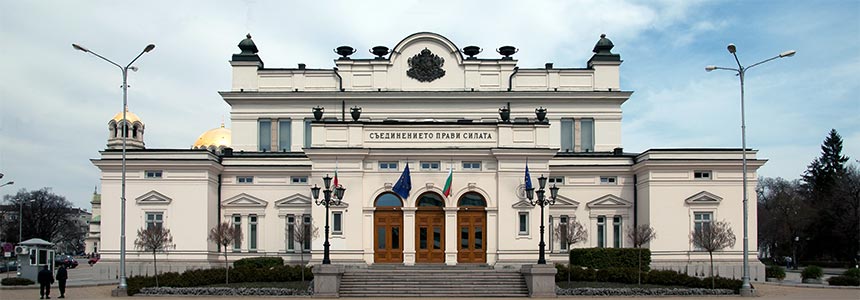
Here you can find everything you need to know about the Bulgarian Parliamentary election. In the run-up to the parliamentary election in Bulgaria, we go through the core aspects of the political system in Bulgaria, the political challenges the country faces, and the impact that this election could have on the EU’s poorest state.
Structure of Bulgarian Politics
Bulgaria is a parliamentary republic. This means that the government receives its power from and is accountable to parliament. While the government runs the country on a day-to-day basis on a national level, parliament must approve changes to legislature, ratifying international treaties as well as approving the government’s proposed budget.
The National Assembly consists of 240 members, serving 4-year terms, with elections taking place accordingly. Bulgaria operates a proportional representation system with the Hare-Niemeyer method. The number of MPs that a party receives depends on how much of the vote they receive as well as the voting districts. Parties must, however, gain a minimum of 4% of the popular vote in order to gain a seat. The results of the Bulgarian Parliamentary election and their impact will be posted when they come in.
The head of state, the president, is elected for a 5-year term. For a president to be elected in the first round, a 50% +1 rule applies meaning that a successful candidate needs one voter over 50% in order to win the election. If no candidate achieves this, the two candidates with the most votes move on to the second round.
Going to the polls: The Bulgarian Parliamentary Election
Parties decide on closed lists of candidates which voters then vote for. Voters may cast their ballots for single independent candidates on a party list. The 4% clause in parliament means that currently 8 parties hold seats:
- GERB (Citizens for European Development of Bulgaria)
GERB is the leading political party at the moment. They run on a pro-EU, center-right political platform and have won the last three elections, gaining over 30% of the vote each time. Their time in office, however, may be coming to an end in the wake of Boyko Borisov’s resignation and an uncertain national sentiment. - BSP (Bulgarian Socialist Party)
The Successor to the Bulgarian Communist party, they are the main leaders in the Coalition for Bulgaria – a left-wing alliance encompassing similarly-minded parties. - Movement for Rights and Freedoms
Running on a Liberal platform, they are a liberal party aiming to represent Muslim and Romani voters. In the past, they usually receive around 8-14% of the vote. - Reformist Bloc
A centre-right electoral alliance between five smaller parties: The Union of Democratic Forces, People’s Party Freedom and Dignity, the Bulgarian Agrarian National Union, the Democrats for a Strong Bulgaria and the Bulgaria for Citizens movement. - Patriotic Front
A Nationalist political alliance between the Bulgarian National Movement (IMRO) and the National Front for the Salvation of Bulgaria (NFSB). - Bulgaria Without Censorship
A conservative, populist party with an emphasis on Euroscepticism. - Attack
A Bulgarian Nationalist party, they are often considered extreme left or extreme right, incorporating anti-immigration and pro-Russian beliefs into their politics. They have been frequently accused of racism and xenophobia. Attack are the fourth largest party in Bulgaria and run on a platform of Anti-EU & NATO. They remain a party to watch over the weekend. - Alternative for Bulgarian Revival
A split from the Bulgarian Socialist Party established in 2014, they are a centre-left political party with a pro-Russian stance.
Politics in Bulgaria:
The parliamentary elections come in the wake of Boyko Borisov resigning from his post as prime minister. His party – GERB – suffered a heavy loss in the presidential election in November 2016 to the pro-Russia and Independent candidate Rumen Radev who was backed by the Bulgarian Socialist Party (BSP). Borisov’s resignation and that of his cabinet resulted in a failure to form an intermediary government, triggering parliamentary elections a year earlier than planned.
Bulgaria remains the poorest country in the European Union. They have struggled to switch over from a centrally planned economy to the free market. Many Bulgarians are disillusioned by recent government’s inability to tackle widespread corruption, poverty and crime. Indeed, Radev combined this sentiment with anti-immigration and pro-Moscow rhetoric to win the election by a significant margin.
The results of these elections could be hugely significant for Bulgaria, Russia and the EU. Bulgaria is a member of the European Union as well as a member of NATO. If national sentiment shifts towards Moscow, it could provide something of a headache for Brussels.
We will be publishing the results, reaction and analysis of the Bulgarian parliamentary election early next week.